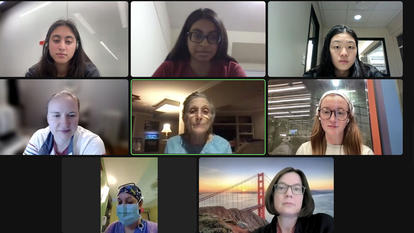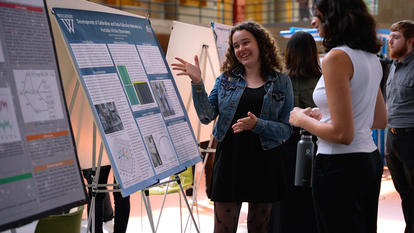
Why Juneteenth Matters: Professor Brenna Greer Shares the History and Significance
On June 19, 1865, Union Maj. Gen. Gordon Granger arrived in Galveston, Texas, and issued an order officially freeing enslaved people in the state—the basis of June 19, or Juneteenth, which has become the most prominent holiday celebrating emancipation in the U.S.
Here, Brenna Greer, associate professor of history at Wellesley, discusses the origins of Juneteenth, how historians shape societal perspectives on activism, and how the holiday has developed.
Why has this particular emancipation become the one most widely celebrated in the U.S. and not, for instance, the signing of the Emancipation Proclamation in 1863, or the ratification of the 13th Amendment that enshrined the end of slavery in the Constitution?
Brenna Greer: By June 1865, President Lincoln had issued the Emancipation Proclamation in 1863 and the Civil War had ended two months earlier. Neither of these events, however, amounted to freedom for hundreds of thousands of Black people.
Although Gen. Robert E. Lee surrendered at Appomattox on April 9, 1865, members of the Confederacy kept up what they deemed “the good fight” well into the next year. During that time, many slaveholders moved west into Texas, trying to evade the Union Army and hold onto their “property.” Meaning, the institution of slavery had relocated to Texas, and it was very much the continued state of being for many Black people after the Civil War’s end.
Juneteenth (“June” and “nineteenth”) commemorates the day—June 19, 1865—that the Union Army arrived in Galveston, Texas, and Maj. Gen. Gordon Granger issued General Order No. 3, which mandated that “…all slaves are free. This involves an absolute equality of personal rights and rights of property between former masters and slaves…” African Americans celebrate Juneteenth because Granger’s announcement marked when the Union Army put down the Confederacy, and thus slavery, in Texas—the last holdout.
One of the classes you teach at Wellesley, “Telling Stories: The Politics of Narrating the Black Freedom Struggle,” explores, in part, how historians have complicated the history of African Americans’ freedom campaigns and considers how their interpretations shape perceptions of Black activism, both past and present. How does that extend to historians’ depictions of Juneteenth?
“African Americans understand that we can never take our freedom for granted because it has never fully, easily, or consistently been granted. Racial justice requires that others–particularly white Americans–understand this as well.”
Brenna Greer, associate professor of history
Greer: Historians are increasingly illuminating the nature, extent, and consistency of investments in Black people’s oppression, which accounts for why, in this nation, Black freedom and racial equality have always required hard-fought battles, sometimes in the most literal and bloodiest sense. Juneteenth reminds us that, in this nation’s history, Black people’s freedom has traditionally been a question of economics and politics, not morality.
People commonly think that President Abraham Lincoln freed all enslaved people with the Emancipation Proclamation issued January 1, 1863. Not true—at all. With the Emancipation Proclamation, Lincoln freed enslaved people in Confederate states, with numerous exceptions. Enslaved people in the border states and in the North remained so. The Emancipation Proclamation is not the moral act of liberation many assume; it was essentially a tactic of war meant to greatly weaken the opponent, which it did—as enslaved people in the Confederacy abandoned slaveholders and went to the Union lines. Even following Juneteenth, many city officials and slaveholders in Texas conspired to keep Black people enslaved until after the harvest.
People also have to remember that communications then weren’t at all what they are now. Imagine, in a world of no phones, social media, or AP service, being an enslaved person on a rural plantation who, in all likelihood, could not read and was restricted from communing with enslaved people on other plantations. How would news of your freedom reach you? Some African Americans were held in peonage, another form of slavery, as late as the 1960s, having never been told they were legally “free.”
African Americans understand that we can never take our freedom for granted because it has never fully, easily, or consistently been granted. Racial justice requires that others—particularly white Americans—understand this as well.
How have commemorations and celebrations of Juneteenth developed since they were first observed in 1866? What are some of the social and historical reasons their popularity has ebbed and flowed over the years?
Greer: Certainly, recognition of Juneteenth has varied widely over time and across populations. Interestingly, until the mid-20th century, whether and how African Americans celebrated Juneteenth often depended on whites. Following the end of slavery, white paternalism fueled support of Juneteenth, with white employers and local officials treating it as a work holiday more than anything else. Following Reconstruction, whites typically suppressed celebrations of Black freedom, which resulted in smaller, more clandestine celebrations of Juneteenth—if any. For much of the 20th century, Juneteenth was largely a southern holiday. It has since grown, with celebrations in many cities that showcase multiple aspects of Black culture, especially art and food.
The significance of Juneteenth in any given year or locality often relates to broader racial politics. Our current moment offers an excellent example. Despite increasing national recognition, with all but two states recognizing Juneteenth as a holiday, I’d venture to say that most white Americans had never heard of Juneteenth until the White House announced that Donald Trump would hold his first campaign rally (his first since the COVID-19 pandemic began) on June 19 in Tulsa, Oklahoma. In 1921, Tulsa was the location of the worst race massacre in U.S. history, during which white mobs entirely destroyed the city’s Greenwood District, which, at the time, was the wealthiest Black community in the United States. The controversy of a Trump rally in Tulsa on June 19 has brought unprecedented awareness to Juneteenth.
Is there added significance surrounding Juneteenth celebrations this year, considering the Black Lives Matter demonstrations and mobilizations that have been happening across the country and even the world?
Greer: The current protests over the police killing of George Floyd and the heightened anger and urgency concerning racial equality ensure that many African Americans will find hope and healing in celebrating Juneteenth this year.
What resources or materials (such as films, books, or podcasts) related to Juneteenth would you recommend for people interested in learning more about it?
Greer: Henry Louis Gates Jr. has a PBS blog post that may be of interest. As the mother of a 4-year-old, in my household we’ve been reading the children’s book Juneteenth for Mazie, by Floyd Cooper.



